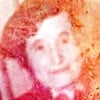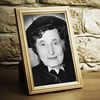While the Soviet government claimed that it allowed religious freedom, it contrived ever more complex laws that made religious observance impossible. In 1939, after fiercely battling the authorities, Rabbi Levi Yitzchak won approval to bake special kosher-for-Passover matzah. Word of Rabbi Levi Yitzchak’s matzah production quickly spread, and Jews from all over the Ukraine and White Russia joyously purchased the matzah. The joy of this achievement was cut short, however, by Rabbi Levi Yitzchak’s sudden arrest.

Rebbetzin Chana’s apartment in Yekatrinoslav
|
On the 9th of Nissan, at 3:00 AM, four NKVD agents appeared at Rabbi Levi Yitzchak and Rebbetzin Chana’s home at 13 Borigodna Street. The agents conducted a search through the apartment, scrutinizing all of the rabbi’s letters and responsa, as well as many of his personal papers. They left nothing untouched.
Three hours later, the officer in charge ordered the rabbi to get dressed and come with them. When Rebbetzin Chana asked where they were taking her husband, she was told that on the following day at noon the military police headquarters would inform her of her husband’s whereabouts. The next day came and went, but she was not given any information, despite her pleas.
Not knowing where her husband was being incarcerated or how he was faring, Rebbetzin Chana began her courageous campaign for his release. She was 59 years old.
In a show trial staged by the Soviets, Rabbi Levi Yitzchak was found guilty of anti-Soviet propaganda and sentenced to five years of exile in the Central Asian region of the Soviet Union. In Kislev 1939, some eight months after he was first arrested, the NKVD summoned Rebbetzin Chana to their headquarters and informed her of the sentence. They gave her a list of items her husband had requested, which included a tallit, tefillin, gartel, Chumash, Tehillim and Tanya. She was also informed that she would be allowed a few moments to bid him farewell, before he was to be exiled.
When she was finally permitted to see him in prison, Rebbetzin Chana was saddened by how weak and frail her husband appeared. Fearing he would not have the strength to survive the difficult journey, the rabbi asked forgiveness of his wife, as one does when nearing death. The couple parted, with Rebbetzin Chana returning home.
Weeks passed with no word as to her husband’s destination. One night, at about 1:00 AM, a young Jewish woman who worked in the post office knocked on Rebbetzin Chana’s door. She bore a telegram stating that Rabbi Levi Yitzchak had been exiled to the far-flung village of Chi’ili, in the republic of Kazakhstan.
Rebbetzin Chana immediately resolved that, come what may, she would journey out to that remote location to join her husband in exile. In the spring of 1940 she traveled to Moscow, and from there took a train to Chi’ili, an arduous journey of five days. She managed to take matzah, wine and some cooking fat with her for the upcoming holiday of Passover. At last she arrived, and was reunited with her husband.








Start a Discussion